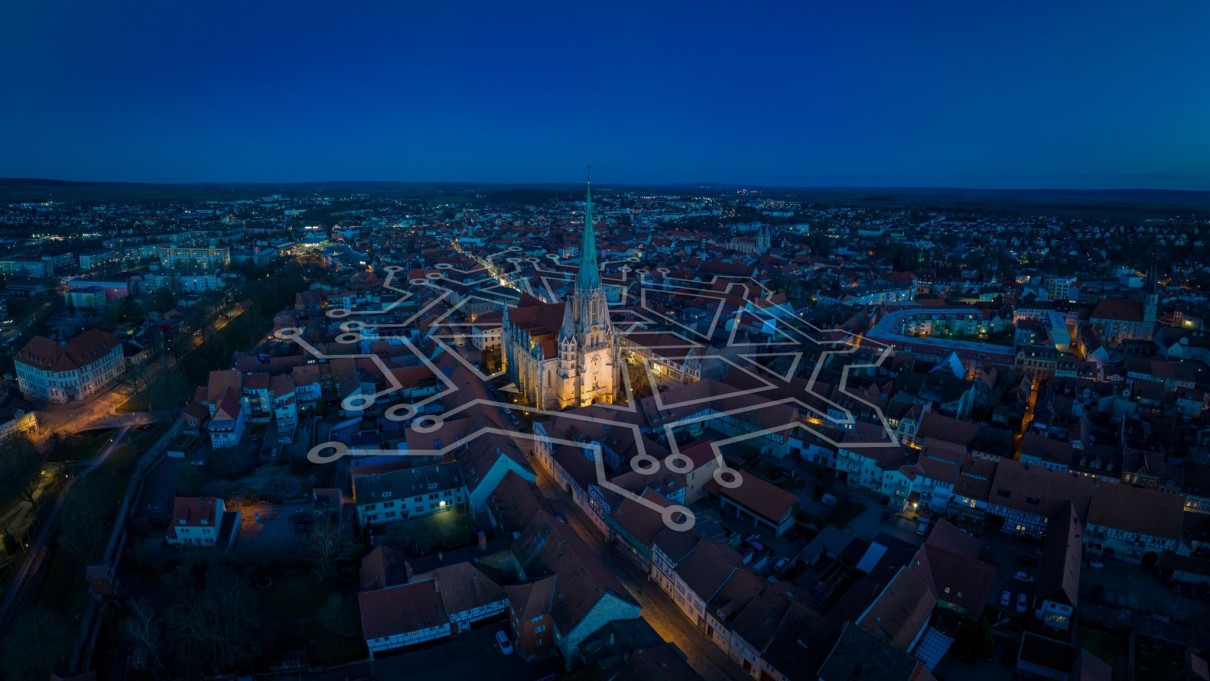Page content
Mühlhausen on the way to becoming a smart city

Mühlhausen, the networked city Photo: City of Mühlhausen
During the coronavirus pandemic, cities and municipalities had to solve a wide variety of problems - from hygiene and safety measures to the digital implementation of council meetings, digital business opportunities to prevent local trade from dying out and digital services for children and senior citizens. Even during the crisis, the city council passed a resolution with an overwhelming majority in February 2021: To apply for the ‘Smart Cities Model Projects’ funding programme, which is now coordinated by the Federal Ministry of Housing, Urban Development and Building (BMWSB). It was clear to those involved: ‘By sticking together and pooling ideas, creativity, expertise and knowledge, we can emerge from the crisis stronger and future-orientated. Digitalisation is helping us to do this,’ says Dr Johannes Bruns, Mayor of Mühlhausen. The funding decision was made in mid-2021 and the city began implementation in 2022.
5 pilot projects for an innovative Mühlhausen
Five pilot projects and one project in the implementation phase have now been realised, and eight further measures are in the advanced planning stage. The following projects already exist in Mühlhausen:
- Urban data platform with a citizen dashboard
The dashboard provides citizens in Mühlhausen with real-time information on free parking spaces, visitors to the municipal swimming pool, anonymised pedestrian numbers from the city centre and an overview of current events. The dashboard can also be used to access other digital services such as the city's own defect report and appointments for the citizens' office.
- Parking space detection project
In order to provide information about the current parking situation in the ‘Am Engelsgarten’/‘Hanfsack’ car park in the citizen dashboard, five sensors were installed in the parking areas. They recognise from above whether the approximately 50 car and 13 camper van parking spaces are occupied.
- 3D city model
Mühlhausen has developed a digital twin using the Martini-Vorstadt model neighbourhood as an example. With the help of the 3D model, better, data-based decisions can be made in urban planning. The aim is to be able to provide better answers to all questions relating to sustainable mobility, climate change protection and adaptation and demographic change in the future.
- City workshop
With the Stadt-Werkstatt, a project space for the Smart City Mühlhausen has been created in the city centre. The project space is the physical centre of the Smart City and was set up in June 2023 in a former shop in the shopping street that had been empty for a long time. The project space not only houses the offices of the Smart City team, but also has an open work area where citizens can find out about the project and get involved themselves.
- Test & swap shop
The first implementation project to be realised was a test and swap shop that opened in the city in July under the ‘Frei.Handel’ brand. A vacant shop was also converted for this purpose. For six months, start-ups, craftspeople, designers, artists, school groups and interested parties can move in here and offer their goods and services. There is also an official exchange platform for small everyday items in the shop.
Gathering experience and sharing knowledge
Mühlhausen has implemented its first projects in the three areas of sustainability, smart city and mobility and has gained some experience in the process. The Smart City team is happy to share this knowledge with other cities, says Kay Freytag, Head of Smart City in Mühlhausen: ‘This has resulted in model approaches and valuable experience, especially for cities of the same size. We are already receiving regular enquiries from other municipalities.’ If cities want to start a Smart City project, he advises: ‘It is essential to create human resources that can deal intensively with the topic. It is also important to find project partners, involve the urban community and focus on the benefits when selecting possible measures.’ Mühlhausen's Smart City Strategy includes a multi-stage strategy process, which Freytag is happy to refer to if you have any questions.
The citizens of Mühlhausen are overwhelmingly in favour of the Smart City project. Freytag emphasises that planned and implemented measures make the Smart City tangible and understandable: ‘Especially when citizens feel a benefit or direct added value, such as with the city workshop or the new test and swap shop “Frei.Handel” - in both cases, contemporary, smart new uses were found for vacant shops in Mühlhausen's city centre, which convince and appreciate people conceptually, but not least also as places of encounter and exchange.’
Mühlhausen relies on digital guides to allay the reservations of older citizens in particular about smart city projects. These are not IT experts, but people who are well versed in modern technology and introduce senior citizens to the topic of digitalisation with patience, empathy and sensitivity. The third series of Digital Pilots workshops will start in autumn.
Urban development in the digital age
The ‘Smart Cities Model Projects’ funding in Mühlhausen expires at the end of 2026. However, the smart city projects will not end in Mühlhausen, says Freytag: ‘The core element of urban development in the digital age is a long-term concern and will accompany the city of Mühlhausen for several decades to come.’
Become an exhibitor at #SCCON25
As a driving force for the future of digital administration and for equal digital living and working conditions in cities and rural areas, the Smart Country Convention is a must for all stakeholders who actively advance the digital transformation. Are you interested in advancing the digitization of our cities and municipalities too? Join us and position your company or municipality as an expert in digitalization in the public sector.



